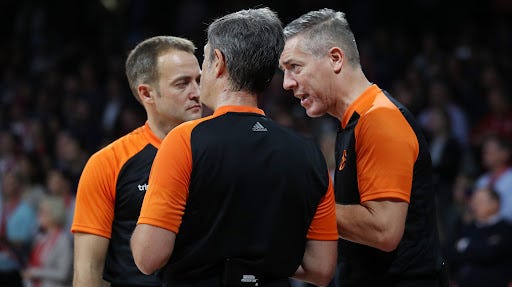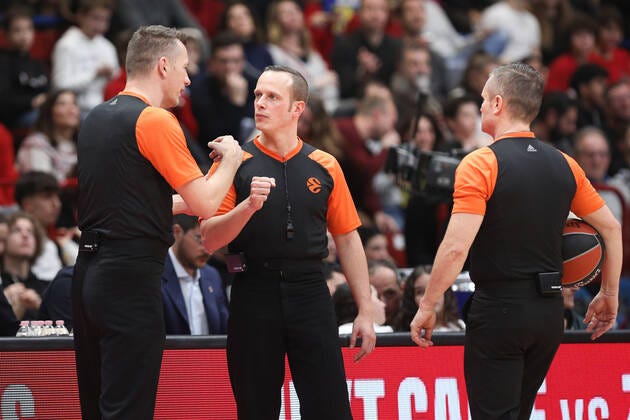7 Solid Reasons to Prioritize Communication with Your Partner
In today's professional landscape, the phrase "excellent communication skills required" has become a common sight in job descriptions. However, when it comes to officaiting, effective communication isn't just a buzzword—it's a game-changer. Cultivating strong communication skills among umpires can yield numerous benefits:
Enhancing Credibility
One of the most significant advantages of effective communication among umpires is the boost it provides to credibility. Collaborative communication with partners not only sharpens personal focus but also fosters coordination, ensuring that everyone on the field is aligned and prepared to fulfill their responsibilities. This coordinated effort not only enhances confidence among partners, coaches, players, and spectators but also contributes to making accurate calls, particularly in challenging situations.
Sustaining Focus
Regular eye contact, non-verbal signals, and clear verbal cues between partners help maintain concentration and readiness for various game scenarios. Anticipating potential plays and ensuring seamless transitions between positions become natural with consistent communication. By staying connected with partners, referees are better equipped to react swiftly and effectively to changing game dynamics, similar to skilled point guards orchestrating plays on the court.
Providing Additional Insight
Effective communication among referees opens avenues for exchanging valuable information, leading to more informed decisions. By working as a cohesive unit, umpires leverage multiple perspectives to assess complex situations accurately. This collaborative approach helps reduce errors and ensures fair and just rulings, especially in situations involving challenging game incidents or disputed calls.
Mitigating Errors
Effective communication with partners can offer insights you may have overlooked or aid in applying unfamiliar rules. Your partner's experiences may shed light on unusual situations or obscure case plays that you haven't encountered yet. Moreover, partnering up can help diffuse tense situations with upset participants and resolve potentially contentious moments. Engaging in pregame and postgame discussions fosters better outcomes in future games. Share information, expect the unexpected, and use most of the travel time with your partners to create a better team. We create bonds as much as we spent time together.
Promoting Consistency
Referees may occasionally lose track of the score or game situation. If unsure, before the next play, simply communicate with your fellow referee. They should provide the necessary information in return and if there's still uncertainty, we can always consult the official scorekeeper or the commissioner. By maintaining communication with your partner and other stakeholders, you'll ensure alignment when making rulings on various game situations such as inbound plays, timing violations, or missed fouls. Before every inbound play, referees should establish eye contact with their partner. In cases of a double foul call on the same play, referees should establish eye contact, signals by nodding or gesturing, and the one with primary responsibility and/or the one who is opposite the scorers table proceeds to make reporting to the table to avoid conflicting rulings. Additionally, referees should discuss their departure plans at the end of the game and leave the court together, typically through the most convenient exit point, often on the side of the winning team
Maximizing Field Coverage
Open channels of communication facilitate strategic discussions on field coverage, ensuring optimal positioning and coordination among referees. Pre-game planning sessions enable referees to synchronize their approaches to specific game scenarios, such as 50/50 positions or transition coverage during player steals. Clear communication also streamlines the criteria of foul standards and enhances efficiency in handling complex plays like unsportsmanlike fouls or game control situations.
Achieving Collective Growth
Overall, prioritizing communication among referees not only enhances individual performance but also fosters camaraderie and mutual support within the officiating team. By establishing open lines of communication, referees cultivate a conducive environment for learning, collaboration, and continuous improvement. Embracing a proactive approach to communication strengthens partnerships, enhances job satisfaction, and ultimately elevates the quality of officiating.
Helpful Resources
Book: "The Art of Communication: Your Competitive Edge" by Jim Stovall and Raymond H. Hull
Podcast: "The Umpire Inspire Podcast" by Scott Kennedy
Online Course: "Effective Communication Skills for Sports Officials" by Udemy
In conclusion, effective communication isn't just a skill—it's a cornerstone of successful officiating. By nurturing open dialogue, mutual respect, and shared accountability, referees can enhance credibility, sustain focus, and promote fairness on the field. Investing in communication skills not only elevates individual performance but also fosters a culture of collaboration and excellence within the officiating community.





